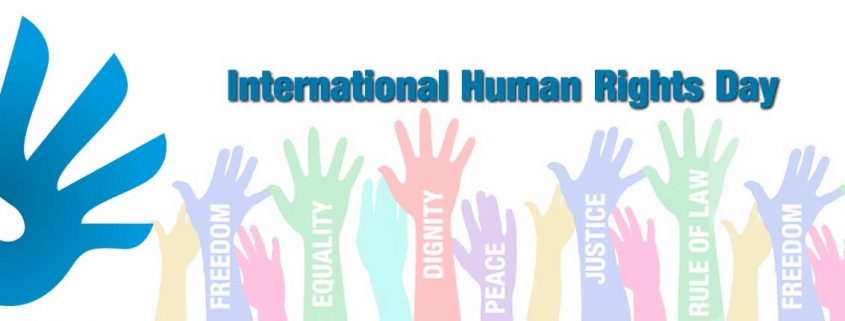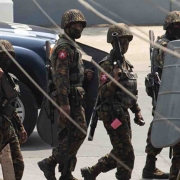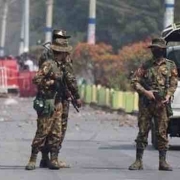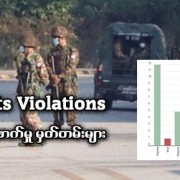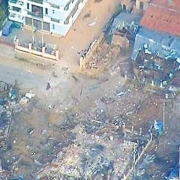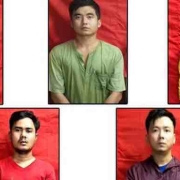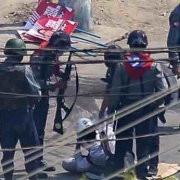On the 72nd International Human Rights Day, the Network for Human Rights Documentation-Burma Calls for An Immediate End to Widespread Violations and A Response to the Humanitarian Crisis in Burma
On the 72nd International Human Rights Day, the Network for Human Rights Documentation-Burma Calls for An Immediate End to Widespread Violations and A Response to the Humanitarian Crisis in Burma
10 December 2020: The Network for Human Rights Documentation-Burma (ND-Burma) is concerned about the escalating human rights situation in Burma. Abuses are widespread and target the most vulnerable; those who are unable to defend themselves against the force of armed military soldiers. Ensuring security for civilians is essential and must be prioritized as the newly re-elected National League for Democracy (NLD) prepares to govern for another five-year term. On this International Human Rights Day, ND-Burma calls on the Burmese government to protect all people in the country, and for everyone’s rights to be respected and upheld, so that meaningful steps can be made towards achieving peace through an inclusive, non-discriminatory approach.
Thousands of innocent civilians have been killed, injured and forcibly displaced over seven decades of internal conflict in Burma. These tragedies have taken place with few cases of reparations and justice for victims and their families. The disappointments of institutions meant to facilitate and advocate for justice, including the Myanmar National Human Rights Commission (MNHRC), have failed them. Article 37 of the MNHRC in particular, which states that the Commission cannot inquire into any complaint that is already involved in court, is just one example of how the broad scope of its mandate limits any influence the MNHRC has in holding offenders accountable. Victims of human rights violations and their families have the right to access justice referral pathways without institutionalized discrimination. This includes the right to know the truth about the abuses they have suffered, including holding the perpetrator responsible. Regardless of the crime, the culprit should not be protected by military courts or government officials.
Despite several ceasefire extensions by the Burma Army to various ethnic armed organizations (EAOs), there is yet to be an inclusive nationwide agreement that includes the Arakan Army (AA). In March this year, the AA was declared a terrorist organization by Burma’s Anti-Terrorism Central Committee. This December marks the two-year anniversary of when fighting escalated between the AA and Burma Army, which prompted an ongoing trajectory of abuses including deaths and injuries from landmine explosions, torture, shelling and artillery fire and sexual violence. Meanwhile, violence by the Burma Army and EAOs continues to systematically target civilians in northern Shan, Chin, Kachin and Karen states. The Tatmadaw and the EAOs full cooperation with the Geneva Convention, which the Burmese government ratified in 1992, is necessary for ensuring standards of international law are applied in the context of war.
As noted in ND-Burma’s most recent human rights situational report released in September 2020, hostilities across the country not only target people living in the areas, but the repercussions faced by journalists, human rights defenders and civil society organizations for reporting on the issues taking place is also of grave concern. A hallmark of any democratic society is one which the rights of the press and to freedom of expression are respected. According to the 2020 World Press Freedom Index, Burma scored 139th, leading Reporters without Borders to declare, “media freedom is clearly not one of the priorities of the [NLD] government.”
For genuine peace to be a reality for the people of Burma, especially those who have carried the conflict on their shoulders for decades, the NLD must take their victory in the 2020 general election as an opportunity to achieve peace, national reconciliation, protection for civilians and promote human rights by working with key stakeholders, including civil society organizations. There is hope that early efforts shown by the Federal Political Negotiation and Consultative Committee agreeing to engage in negotiations with the NLD are a positive sign of things to come. These talks must ensure civilian safety is at the forefront of guiding prospects of achieving a federal union.
Further, ND-Burma members are gravely concerned about Burma’s future. Without security and transitional justice mechanisms in place, innocent people will continue to be at risk. Further, we call for the Geneva Convention to be followed by the Tatmadaw and EAOs, and for civilian lives and their properties to be protected. Those who fail to do so must be held accountable for their actions in a court of law that takes seriously the failure to uphold these commitments.
Media Contact
U Aung Zaw Oo
Association Human Rights Defenders and Promoters (HRDP)
+95 942 103 9493
Lway Poe Jay
Ta’ang Students and Youth Union (TSYU)
+95 926 416 2229
ND-Burma is a network that consists of 13-member organisations who represent a range of ethnic nationalities, women and former political prisoners. ND-Burma member organisations have been documenting human rights abuses and fighting for justice for victims since 2004. The network consists of nine Full Members and four Affiliate Members as follows:
Full Members:
1. All Arakan Students’ and Youths’ Congress (AASYC)
2. Assistance Association for Political Prisoners (AAPP)
3. Association Human Rights Defenders and Promoters (HRDP)
4. Future Light Center (FLC)
5. Human Rights Foundation of Monland (HURFOM)
6. Kachin Women’s Association – Thailand (KWAT)
7. Ta’ang Women’s Organization (TWO)
8. Ta’ang Students and Youth Union (TSYU)
9. Tavoyan Women’s Union (TWU)
Affiliate Members:
1. Chin Human Rights Organization (CHRO)
2. East Bago – Former Political Prisoners Network (FPPN-EB)
3. Pa-O Youth Organization (PYO)
4. Progressive Voice(PV)

